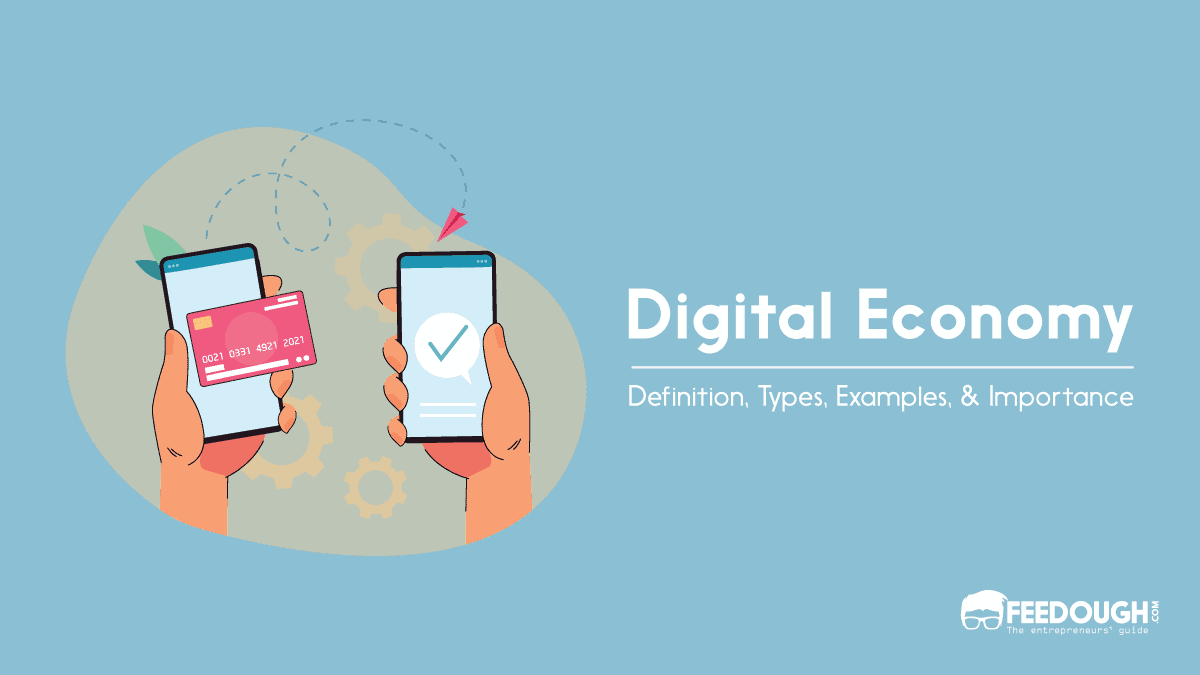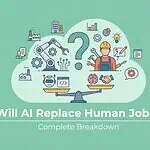The world has become digital and so has the economy. The digital economy is the result of the transformation of traditional economic activities, products, and services into digital form. It’s based on the internet and supported by electronic means.
The digital transformation of the economy has led to the creation of new business models, new products and services, and new ways of doing business. This digital economy is growing at a rapid pace and is expected to continue to do so in the coming years.
But what is the digital economy? And how does it work?
To know that, one must understand what an economy is. An economy is a system that produces and distributes goods and services in an effort to satisfy the needs of society.
The digital economy is what we get when the traditional methods and activities of an economy are digitised or when new economic activities that are only possible because of the internet and digital technologies emerge.
What Is Digital Economy?
The digital economy is the economy resulting from the digital transformation of traditional economic activities powered by the internet, electronic means, and data.
In simple terms, it’s the economy that exists when the traditional economy capitalises on technological change leading to the exchange of new offerings and the creation of new business models and markets.
This digital transformation is driven by the following:
- The internet – The internet has taken over the world and transformed how we live, work, and play. It’s created a global market for goods and services and made it possible for businesses to reach new markets and customers.
- Electronic means – The digital economy is powered by electronic means such as computers, smartphones, and other digital devices like smart TVs, wearable devices, and so on.
- Data – Data is the lifeblood of the digital economy. It’s used to create new products and services, make decisions, target customers, and much more.
The digital economy is the result of billions of daily connections between people, businesses, devices, and data. It’s a global, interconnected economy that’s not limited by geographical boundaries.
How Does the Digital Economy Work?
The digital economy works similarly to the traditional economy but with a few key differences.
Like the traditional economy, the businesses in the digital economy produce goods and services exchanged for money. The difference is that the products, channels, and currency are digitised in the digital economy.
For instance, in the traditional economy, one might buy a physical product like a book from a brick-and-mortar store in exchange for currency notes. In the digital economy, the same person can purchase an e-book from an online store and pay for it using a digital currency or a cryptoasset like Bitcoin.
The way businesses operate has also changed. Businesses would rely on print advertisements and word-of-mouth to reach their target audience in the past. But in the digital economy, businesses can use social media, search engine optimisation (SEO), and other digital marketing techniques to reach their target market.
Components Of The Digital Economy
Thomas Mesenbourghg, an American statistician and economist, has identified three key components of the digital economy. They are:
- E-Business Infrastructure: This refers to the electronic systems that businesses use to conduct their operations. This includes the hardware, software, networks, and data storage systems.
- E-Business: It is the conduct of business activities through the use of electronic systems. This includes the processes of buying and selling and the marketing, production, and delivery of goods and services digitally.
- E-Commerce: This is the buying and selling of goods and services through electronic systems. This includes exchanging money, goods, and services between businesses and consumers.
However, today’s digital economy is much more complex and goes beyond these three components and includes e-governance, e-banking, and so on.
Characteristics Of Digital Economy
The digital economy has the following characteristics:
- Driven by the internet: The internet is the backbone of the digital economy. It’s what makes it possible for businesses to reach new markets and customers.
- Global: The digital economy is not limited by geographical boundaries. It’s a global, interconnected economy that allows businesses to reach new markets and customers.
- Always on: The digital economy is available 24/7. This means that businesses can operate round-the-clock and reach out to customers at any time.
- Fast-paced: The digital economy moves at a fast pace. This is because of the continuous innovation and the introduction of new technologies.
- Data-driven: Data is the lifeblood of the digital economy. Businesses use data to create new products and services, make decisions, target customers, and much more.
- Competitive: The digital economy is highly competitive. This is because customers now have more choices, and businesses have to fight for their attention.
The Importance Of The Digital Economy
The digital economy overcame the limitations of the traditional economy in every aspect possible, be it in production, marketing, or commerce.
Today, it is the single most important driver of innovation, growth, and job creation.
The digital economy has transformed the way businesses operate and has created new opportunities for them. It has also changed the way consumers behave and has given them more power.
The rise of the digital economy is crucial as it:
- Helps reach more customers: The digital economy has made it possible for businesses to reach new markets and customers. This is because of the global nature of the internet.
- Reduces costs: Technology has made it possible for businesses to reduce their costs regarding marketing, production, and distribution by replacing traditional methods with more efficient digital ones.
- Improves efficiency: The digital economy has helped businesses become more efficient as they now have access to better tools and technologies and can even use data to get the best results.
- Generates new jobs: The digital economy has generated new job opportunities as there is an influx of new businesses and startups. It has also created new job roles such as digital marketing, big data analyst, data mining, and so on.
- Leads to innovation: Digitising businesses and business processes lead to innovation. This is because it allows businesses to experiment with new ideas and technologies to produce, market, and sell their products and services.
The digital economy has brought about a fundamental change in the way businesses operate. It has also changed the way consumers behave. Hence, it has become a vital part of the global economy that can no longer be ignored.
Not just the businesses but the government too (like that of India and the USA) has started to realise the importance of the digital economy and is now promoting its advantages.
Advantages Of The Digital Economy
The digitisation of the traditional economy has led to the following advantages:
- Increased productivity: The digital economy has increased the productivity of businesses as they can now use technology to automate their operations and processes.
- Increased competitiveness: Businesses today are able to use the internet to reach new markets and customers. Moreover, they can also use technology to improve their products and services. This has increased the competitiveness of businesses.
- Increased employment opportunities: The digital economy has generated new job opportunities as new businesses are springing up. It has also created new job roles spread all over the world.
- Improved living standards: Today, digitised businesses can offer their customers better products and services at lower prices. Moreover, offerings are now available on-demand, which has improved people’s living standards.
- Better quality of life: The digital economy has made it possible for people to work from anywhere in the world. This has improved the quality of life of people as they can now balance their work and personal life. On the consumer front, the digital economy has made it possible for people to access a wide range of products and services with just a few clicks. Not just products and services, but people can also now access information and knowledge and connect with others with the help of the internet.
- Reduced costs: Digitisation has helped businesses replace manual tasks with automated processes. This has reduced the costs of businesses and has led to lower prices of products and services for consumers.
- Faster transactions: The digital economy has made it possible for businesses to conduct transactions faster as they can now use online payment methods. This is not just restricted to businesses but extends to individuals as well, who can now transfer money online with just a few clicks.
- Improved efficiency: Digitisation of processes has helped businesses become more efficient by removing error-prone manual tasks. Moreover, businesses now have access to better tools and technologies that help them get the best results.
- Innovation: The digitisation of businesses and business processes leads to innovation with respect to not just offerings but also the way businesses operate.
- More personalisation: As more data is collected about customers, businesses are now able to offer them more personalised products and services.
- Greater convenience: Customers today can buy products and services from the comfort of their homes. New business models like e-commerce and m-commerce have made it possible for customers to shop anytime, anywhere.
- Increased transparency: The digital economy has increased the transparency of businesses as they can now use technology to share information with their customers.
- Improved communication: Increased connectedness in the digital economy has made it possible for businesses to communicate with their customers more effectively. They now have a number of channels through which they can reach their customers including social media, email, and SMS.
Disadvantages Of Digital Economy
Even though the digital economy has a number of advantages, it also has some disadvantages which are listed below:
- The digital divide: One of the biggest disadvantages of the digital economy is the digital divide. This is the gap between those who have access to technology and those who don’t. This divide exists not just between countries but also within countries. This has created a new form of inequality in the world.
- Cybercrime: The increased use of technology has also led to an increase in cybercrime. This is because criminals can now use technology to commit crimes like identity theft, fraud, and money laundering.
- Data security: With businesses collecting more and more data about their customers, there is a risk of this data being leaked or stolen. This can lead to a loss of trust between businesses and their customers.
- Unemployment: The digitisation of the economy has led to job losses in some sectors as businesses have replaced human workers with technology. This has increased unemployment in these sectors.
- Privacy concerns: As businesses collect more data about their customers, there are concerns about the misuse of this data.
- Heavy investments: The digitisation of businesses requires heavy investments in technology. This is a challenge for small businesses which might not have the resources to invest in technology.
- Monopoly: The digitisation of the economy has led to the rise of a few big companies which have become very powerful. This has created a monopoly in some sectors.
- Addictive nature: The digital economy is very addictive in nature. This is because it is designed to keep people hooked on their devices. This can lead to a number of problems like addiction, anxiety, and depression.
- Potential environmental impact: The increased use of technology in the digital economy has led to an increase in the number of e-waste and heavy carbon footprint. This is a concern as it can have a negative impact on the environment.
Digital Economy Vs Traditional Economy
The new digital economy is a lot similar to the traditional economy but there are some key differences between the two which are listed below:
In the traditional economy, businesses used paper records and manual processes to carry out their operations. This is no longer the case in the digital economy as businesses now use technology to store data and carry out their operations.
In the traditional economy, businesses sell physical products to their customers. In the digital economy, businesses can sell physical as well as digital products.
Moreover, the channels through which they sell these products have also changed. In the traditional economy, businesses would sell their products through brick-and-mortar stores. In the digital economy, businesses can sell their products online through e-commerce platforms.
Even the mode of payment has changed in the digital economy. In the traditional economy, businesses would accept cash as a mode of payment. In the digital economy, businesses can accept various modes of payment including credit cards, debit cards, ewallets, and mobile payments.
Examples Of Digital Economy
Several businesses have disrupted their respective industries giving rise to the digital transformation of the existing economy. Some of the most notable examples are listed below:
Netflix
Netflix is a streaming service that offers its users a wide range of TV shows, movies, and documentaries over the internet. The company started out as a DVD rental service but soon switched to streaming when it realised the potential of the internet.
Today, Netflix has over 222 million subscribers and is available in 190 countries. The company has also produced its own content which has been very successful.
Uber
Uber is a ride-hailing service that allows its users to book a ride with the tap of a button. The company uses technology to connect riders with drivers. Uber was founded in 2009 and is available in 71 countries and more than 890 cities.
The company disrupted the traditional taxi industry by incorporating technology into the usual taxi booking scenario. Doing so, it created an entirely new business model called the aggregator business model.
Airbnb
Airbnb is an online marketplace that allows people to list, find, and rent vacation homes. The company was founded in 2008 and is available in 220 countries and more than 100,000 cities.
The platform gave rise to the sharing economy and disrupted the traditional hotel industry by just being available online.
Amazon
Amazon brought marketplaces and commerce to the web and pioneered the concept of e-commerce. The company started as an online bookstore but soon diversified into other areas such as selling electronics, clothing, food, and more.
Amazon is now the world’s largest e-commerce platform with around 600 million monthly active users. The company has also developed its own line of products which are very popular among its users.
Google is one company that gets its roots right in the digital economy. The company started as a search engine but soon expanded into other areas such as advertising, cloud computing, and more.
Google is now the world’s largest internet company with a wide range of products and services. The company has also ventured into hardware with its line of Pixel smartphones.
Go On, Tell Us What You Think!
Did we miss something? Come on! Tell us what you think about our article in the comments section.
A startup consultant, digital marketer, traveller, and philomath. Aashish has worked with over 20 startups and successfully helped them ideate, raise money, and succeed. When not working, he can be found hiking, camping, and stargazing.







![How To Start A Business Abroad [Complete Guide] Start A Business Abroad](https://www.feedough.com/wp-content/uploads/2024/06/Start-A-Business-Abroad-150x150.webp)

